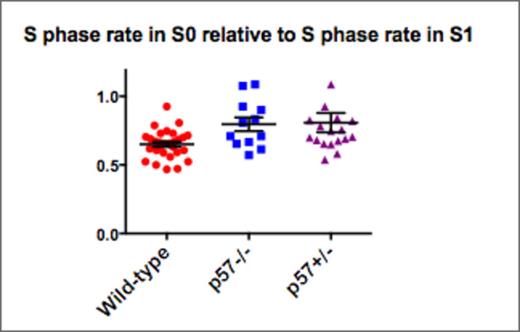Abstract
We characterized a rapid commitment switch in mouse fetal liver cells in vivo, that activates the GATA-1 –dependent erythroid transcriptional program as well as other key erythroid differentiation milestones including the reconfiguration of chromatin at erythroid gene loci, and the onset of erythropoietin dependence (1,2). Our published work shows that this switch takes place in early S phase of the last CFU-e generation, as cells transition from flow cytometric Subset 0 (S0, Lin-CD71medium) to Subset 1 (S1, Lin-CD71high). This S0/S1 commitment switch requires S phase progression, and unexpectedly, is associated with a 50% increase in the rate at which S phase cells synthesize DNA (1,2). This latter observation suggests that the duration of S phase is altered during the commitment switch, becoming shorter and faster in S phase cells in S1, compared with S phase cells in S0. We also found that the accelerated DNA synthesis in S phase cells in S1 is essential for an unusual process of genome-wide DNA demethylation, which is rate- limiting for erythroid gene transcription (2). While it is well documented that growth factors may promote shorter cell cycles, this has been considered to be largely the result of their ability to promote the transition from G1 to S phase, resulting in a shorter G1 phase. By contrast, relatively little is known of how S phase duration is modulated during cell fate decisions and differentiation. Here we determined directly the lengths of S phase in CFUe cells and during subsequent erythroid differentiation in the fetal liver in vivo; and identified the cyclin-dependent kinase (CDK) inhibitor, p57KIP2, as a key regulator of S phase duration at the S0/S1 commitment switch.
To measure S phase duration, we injected pregnant female mice sequentially with two nucleotide analogs: first, with BrdU, and 2 hours later, with EdU. Fetal livers were harvested shortly following the second injection. Cells that were in S phase during the time of the first injection, but have left S phase by the time of the second injection, were measured as the BrdU+EdU- fraction. This approach allowed us to determine that S phase duration in S0 cells is 7.5 hours, transiently falling to under 4 hours in S1 cells, before resuming a slower pace in more differentiated, Ter119high erythroblasts.
We identified the cyclin-dependent kinase (CDK) inhibitor, p57KIP2, as a novel negative regulator S phase DNA synthesis rate. p57KIP2 is expressed in S phase cells in S0, prior to the commitment switch, and is rapidly downregulated (>30 fold) during the switch (1). Here we found that its exogenous over-expression in S0 cells prevented S phase from becoming shorter and faster in S1.
We therefore proceeded to investigate p57KIP2-null mice, found to die perinatally with a range of developmental abnormalities; their erythropoietic system was not investigated (3,4). We found that mouse embryos deficient for p57KIP2 are variably pale and/or anemic. Their fetal liver S0 cells showed premature shortening of S phase prior to the commitment switch, as deduced from an elevated DNA synthesis rate in S phase cells of p57KIP2+/- or p57KIP2-/- S0 cells (reaching 83% of the DNA synthesis rate in S1 cells in the same fetal livers; p<0.007; n=12 p57KIP2-/- embryos and 18 p57KIP2+/- embryos), compared with the intra-S phase DNA synthesis rate of S0 cells in wild-type littermates (where DNA synthesis reaches only 64% of the DNA synthesis rate in S1 cells, n=28; see Figure). The premature shortening of S phase in S0 of p57-deficient embryos was associated with increased cell death, as measured by Annexin V, and with reduced differentiation. The latter was deduced from the significantly increased frequencies of earlier erythroid progenitors in the S0 subset (increased by 27% in p57KIP2+/- embryos, p<0.0008; and by 34% in p57KIP2-/- embryos, p<0.025) and a corresponding decrease in later, Ter119+ cells.
We conclude that the efficient activation of the erythroid differentiation program at the S0/S1 commitment switch requires transient shortening of S phase. S phase becomes shorter and faster, most likely as a result of increased S phase CDK activation, when p57KIP2 expression is rapidly down-regulated at the S0/S1 transition.
References:
1. Pop, R. et al., PLoS Biol, 2010. 8(9)
2. Shearstone, J.R., et al., Science, 2011. 334:799
3. Yan, Y., et al., G&D 1997. 11:973
4. Zhang, P., et al., Nature 1997. 387:151
No relevant conflicts of interest to declare.
Author notes
Asterisk with author names denotes non-ASH members.


This feature is available to Subscribers Only
Sign In or Create an Account Close Modal